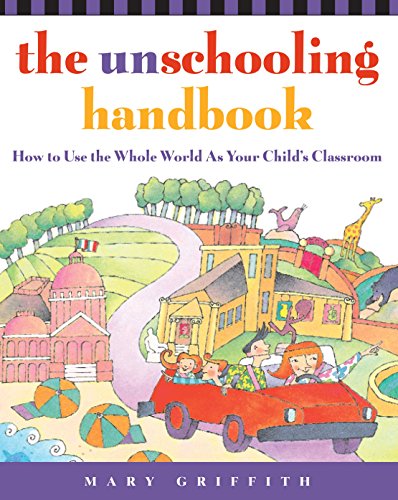The Unschooling Handbook: How to Use the Whole World As Your Child’s Classroom Link to heading
Summary Link to heading
The Unschooling Handbook by Mary Griffith explores the concept of unschooling, an educational philosophy that rejects traditional schooling in favor of a more child-led, experiential approach to learning. The book advocates using the everyday world as a classroom, where children learn through their natural curiosity and interests rather than a structured curriculum. It includes practical advice on how to facilitate unschooling, insight into legal considerations, and diverse anecdotal evidence from parents who have chosen this path for their children.
Review Link to heading
Mary Griffith’s The Unschooling Handbook provides a comprehensive guide for parents interested in the unschooling approach. The book is praised for its practical advice, encouraging skepticism towards conventional schooling practices, and helping parents to trust in their child’s ability to learn organically. One notable strength is its accumulation of real-life examples and testimonials, which provide a rich resource for understanding how unschooling works in practice. However, some critiques highlight the lack of empirical data supporting unschooling outcomes and a reliance on anecdotal evidence.
Key Takeaways Link to heading
- Child-Led Learning: Emphasizes the importance of allowing children to follow their interests and learn through lived experiences.
- World as Classroom: Advocates treating everyday activities and environments as learning opportunities.
- Trust in Natural Curiosity: Encourages parents to trust in the child’s innate curiosity and motivation to learn.
- Parent’s Role as Facilitator: Describes the parent’s role in providing resources, guidance, and support without imposing a rigid structure.
- Flexibility and Adaptability: Highlights the importance of being adaptable and open to changes in the learning process.
Recommendation Link to heading
The Unschooling Handbook is recommended for parents and educators interested in alternative approaches to education, particularly those curious about unschooling. It is particularly useful for families considering or already practicing homeschooling and looking for ways to incorporate a more flexible, interest-based learning style. The book offers inspiring perspectives and practical strategies, making it a valuable resource for those exploring how to use the entire world as a learning environment for children.
